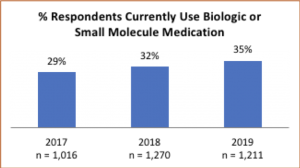
HCP satisfaction and psoriasis control are greater with biologics, so what’s the barrier?
Over the past several years, the psoriasis treatment landscape has changed dramatically. People living with psoriasis have been introduced to a variety of new treatment options from oral systemic agents to biologic agents and to new ways in which these medications can work. Psoriasis In America 2019, a Health Union syndicated survey of 1,211 people diagnosed with psoriasis, aimed to uncover the intricacies of living with psoriasis including navigating treatment decisions and managing their overall health and wellness. The survey findings reveal a shift to greater use of biologics and small molecule medications and shed light on the barriers that still exist for many patients when it comes to considering these types of treatment options.
Since 2017, Health Union’s annual Psoriasis In America surveys show the adoption rate of biologics and small molecule medication has been steadily increasing (see chart below).
Interestingly, the annual surveys continue to show low numbers of patients who feel their psoriasis is controlled under their current treatment plan—only 14%* of all respondents in 2019 feel their psoriasis is controlled—but of those on a biologic or small molecule medication, that feeling of control increases to 26%* of respondents. In addition, respondents using biologics or small molecule medications indicated higher levels of satisfaction with their healthcare professional (HCP)* than those who were not currently using those medications.
If these treatments can lead to higher satisfaction with their HCP and better control of their psoriasis symptoms, it’s critical to understand the barriers patients still face when considering these specific treatments for their own use.
Patients are still encountering barriers to biologic usage
When asked about the barriers they face in receiving psoriasis treatment like biologics, patients indicate some common issues such as insurance coverage or the treatment’s cost. Over half of respondents cite fear of side effects as a considerable barrier.
However, respondents also indicated that their healthcare professional acted as a barrier to receiving treatment—with some stating in open-ended questions that their HCP was not willing to prescribe new-to-market treatments or change the patient’s current medication.
Barriers related to HCP satisfaction and communication go even deeper. The Psoriasis In America 2019 survey data reveal that those who are not currently using a biologic are more likely to be currently seeing a primary care provider (PCP) versus a rheumatologist or dermatologist—and those seeing a PCP are less likely to say their HCP explains treatment options clearly (vs. a rheumatologist or dermatologist).
Biologics are proving to have a positive effect on psoriasis patients—and biopharma marketers must continue to reach patients at critical moments to help impact conversations with their healthcare professionals. Health Union’s approach to cultivating online health communities, like PlaquePsoriasis.com, through meaningful patient engagement brings people together in the moments that matter. Partnering with Health Union’s online health communities enables marketers to:
- Integrate qualitative and quantitative insights to better understand people’s wants and needs in order to reach patients in the right places and at the right moment in time.
- Participate directly in the conversation through custom media opportunities–enabling efficient engagement with the right audiences.
- Engage indirectly by targeting media placements around content that’s most relevant to the patient, ensuring a broad reach beyond social and community platforms.
Learn more on how Health Union can help you create smarter, more effective programs for patients and caregivers through business solutions in media/advertising, marketing research, and clinical services.
*Top 2 box on a 7-point scale



